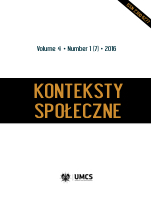How the emergence of social networking sites challenges agenda-setting theory
How the emergence of social networking sites challenges agenda-setting theory
Author(s): Ilona Grzywińska, Dominik BatorskiSubject(s): Media studies, Communication studies, Sociology, Theory of Communication
Published by: Wydawnictwo Naukowe Uniwersytetu Marii Curie-Sklodowskiej
Keywords: agenda-setting theory; social networking sites; homophily; network effect; active audience
Summary/Abstract: With the emergence of social networking sites (SNS), the way that information is being processed by media consumers has changed drastically. This has had a direct impact on one of the most established media theories: agenda-setting theory. Applying the framework presented in 2005 by McCombs, the authors of the article show how the main assumptions of the theory are being challenged in its five stages. SNS users decide what news is important by choosing what to share within their networks (basic agenda-setting effects); attributes regarding events are issued by SNS users under particular limitations (attribute agenda-setting); in conditions of high uncertainty and relevance, SNS users can directly impact public opinion (psychological effects of agenda-setting theory); SNS are becoming the source of traditional media agendas (sources of media agendas); SNS users are reaffirming their opinions as a result of SNS homophily (consequences of agenda-setting effects); and users influence public figures within SNS (reverse agenda-setting effects).
Journal: Konteksty Społeczne
- Issue Year: 4/2016
- Issue No: 1 (7)
- Page Range: 19-32
- Page Count: 14
- Language: English

